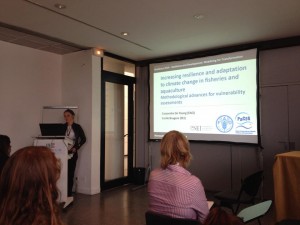Assessing climate change vulnerability in fisheries and aquaculture
Whether considered in relation to climate change, disasters, globalisation and economic development, and social-ecological system changes more generally, vulnerability is a complex and multi-faceted concept that has attracted the attention of scholars and development practitioners from all disciplines. Vulnerability assessments can be used for many things, but one of its ultimate purposes is to improve the targeting and effectiveness of adaptation actions.
Many economies and people are dependent on fisheries and aquaculture for food, livelihoods and revenue generation. Greenhouse gas accumulation, climate change and their associated impacts  in terms of sea level rise, ocean acidification and changes in salinity, precipitation, etc. are affecting the state and productivity of aquatic habitats and increasing risks to people and infrastructures. These changes are in addition to the multiple drivers of change already faced within the sector, such as changes in markets, management, fishing practices and demographics.
in terms of sea level rise, ocean acidification and changes in salinity, precipitation, etc. are affecting the state and productivity of aquatic habitats and increasing risks to people and infrastructures. These changes are in addition to the multiple drivers of change already faced within the sector, such as changes in markets, management, fishing practices and demographics.
In the face of these changes, a vulnerability assessment can help us understand how fisheries and aquaculture – and the economies and communities that depend on them – may be able to cope with (or not) and take advantage of existing and projected changes so that we may act now to enhance their capacity to adapt and ensure human and ecosystem well-being.
Not all vulnerability assessment methodologies are the same however, and the answers they yield are highly dependent on the school of thought in which they are grounded. In the context of fisheries and aquaculture, most vulnerability assessments have so far relied on quantitative, top-down assessment methodologies investigating climate risk impacts and "outcome vulnerability" (i.e. vulnerability to climate and other biophysical changes). More research and pilot implementations of vulnerability assessments documenting the social causes of vulnerability (i.e. "contextual vulnerability") are needed. 
The review of vulnerability assessment methodologies and their relevance to fisheries and aquaculture supported discussions held during the global Expert Workshop on Assessing Climate Change Vulnerability in Fisheries and Aquaculture: Available Methodologies and their Relevance for the Sector. This workshop was convened by the FAO Fisheries and Aquaculture Department Climate Change Working Group and the Global Partnership on Climate, Fisheries and Aquaculture (PaCFA) in Windhoek, Namibia, from 8 to 10 April 2013, and hosted by the Benguela Current Commission. The workshop report contains key outcomes of the discussions and recommended steps for future vulnerability assessments in fisheries and aquaculture. It is available here.
The review was presented at the Resilience 2014 Conference: "Resilience and Development: Mobilizing for Transformation", 4-8 May 2014, Montpellier, France, under the title: "Increasing resilience and adaptation to climate change in fisheries and aquaculture: Methodological advances for vulnerability assessments".
An annotated bibliography on the application of climate change vulnerability assessment methodologies in fisheries and aquaculture was also prepared alongside this review. It is available here. 
